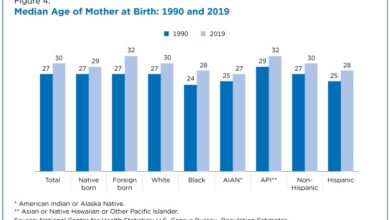
Why fathers are important to children? This isn’t just a question; it’s a journey into the profound impact a father’s presence has on a child’s life. From shaping emotional intelligence and fostering cognitive growth to nurturing social skills and influencing a child’s physical development, a father’s role is multifaceted and crucial. We’ll explore the ways in which fathers contribute to a child’s overall well-being and future success.
The following sections will delve into the various facets of fatherhood, examining how a father’s involvement directly impacts a child’s emotional, cognitive, social, and physical development. We’ll also consider how fathers shape a child’s identity and ultimately contribute to their future success. This exploration will be grounded in evidence and examples, offering valuable insights for both fathers and those interested in understanding the vital role of fathers in a child’s life.
Fathers’ Role in Emotional Development
A father’s presence significantly impacts a child’s emotional landscape. Beyond providing financial security and structure, a father plays a crucial role in nurturing emotional intelligence, fostering empathy, and instilling a sense of security. A strong father-child bond can equip children with the emotional tools needed to navigate life’s challenges with resilience and understanding.A father’s emotional availability creates a safe space for children to explore and express their emotions.
This emotional responsiveness teaches children how to identify, understand, and manage their feelings. Children learn to regulate their emotions by observing and interacting with their fathers, who often model healthy emotional responses. This, in turn, equips children with the ability to understand and empathize with others.
Impact of Father Involvement on Emotional Intelligence
A father’s consistent presence and emotional engagement contribute substantially to a child’s emotional intelligence. This includes recognizing and understanding their own feelings, as well as those of others. A father who actively listens, validates emotions, and offers constructive feedback empowers children to develop emotional regulation skills.
Examples of Emotional Support from Fathers
Fathers who demonstrate patience and understanding when children express sadness, anger, or frustration, provide valuable models for healthy emotional processing. For instance, a father calmly acknowledging a child’s disappointment after a sports loss teaches the child that it’s okay to feel disappointed and that emotions can be processed constructively. Another example is a father who actively encourages a child to express their feelings through words or creative outlets, fostering emotional literacy.
Dads are crucial for a child’s development. They provide a unique perspective and support that moms often can’t replicate. Understanding the intricate workings of the human body, like the superficial muscles of the neck, which control posture and movement , highlights the complexities of nurturing and shaping young minds. Ultimately, a father’s role is fundamental in a child’s emotional and physical well-being, guiding them towards a healthy and fulfilling life.
Fostering Empathy and Compassion Through Fatherly Influence
Fathers play a vital role in cultivating empathy and compassion in their children. By modeling empathy in their interactions with others, and showing compassion for their child’s struggles, fathers demonstrate the importance of considering others’ feelings. For example, a father who volunteers at a soup kitchen, explaining the value of helping those in need, instills empathy in his child.
This type of experience demonstrates that kindness and concern for others are valuable traits.
Dads are crucial for kids’ development, providing guidance and support. A strong father-child bond fosters confidence and resilience. Healthy eating habits, like those found in a plant-based diet, can be just as important, particularly for fueling workouts, helping children stay active and strong, mirroring the strength and energy fathers often bring to their families. Plant based nutrition fueling workouts can be a key part of that.
Ultimately, a healthy, active lifestyle, and the positive role models fathers provide, are vital for children’s overall well-being.
Emotional Availability and Security
A father’s emotional availability is intrinsically linked to a child’s sense of security. Children who experience consistent emotional support from their fathers often feel more secure and confident in their ability to navigate the world. This secure attachment provides a foundation for emotional resilience and healthy relationships in the future. Conversely, a lack of emotional availability can lead to feelings of insecurity and anxiety in children.
Comparing Emotional Development in Children with Involved vs. Less Involved Fathers
Children with actively involved fathers often display greater emotional regulation skills and exhibit higher levels of empathy and compassion. They tend to be more resilient in the face of adversity and demonstrate a better understanding of their own emotions and those of others. Children with less involved fathers may struggle with emotional regulation, potentially displaying heightened anxiety or irritability.
Their understanding of emotions and empathy may also be less developed.
Emotional Responses Based on Father Involvement
| Father Involvement Level | Emotional Response | Potential Cause | Strategies for Support |
|---|---|---|---|
| Highly Involved | Demonstrates emotional regulation, high empathy, and resilience. | Consistent emotional support and modeling of healthy emotional responses. | Continue fostering open communication and emotional expression. |
| Moderately Involved | Displays some emotional regulation skills, but may struggle with certain emotions. | Inconsistent emotional support, potentially limited opportunities for emotional processing. | Encourage consistent emotional expression and encourage seeking support when needed. |
| Less Involved | May exhibit difficulty regulating emotions, heightened anxiety, or irritability. | Limited emotional support and modeling of healthy emotional responses. | Seek professional guidance to address potential emotional needs and build a stronger father-child relationship. |
| Absent | May experience insecurity, anxiety, or difficulty understanding emotions. | Lack of emotional support and modeling. | Explore alternative support systems, such as extended family or community resources. |
Fathers’ Influence on Cognitive Development

A father’s role extends far beyond providing for his family; he plays a crucial part in shaping his child’s cognitive development. A supportive and engaged father can foster a child’s intellectual curiosity, impacting their academic performance and critical thinking skills. This influence extends to a child’s ability to solve problems and express creativity.Fathers who actively participate in their children’s lives often create a stimulating environment that encourages learning and exploration.
This engagement can lead to a positive feedback loop, where the child’s cognitive abilities flourish, and the father’s satisfaction in seeing their child grow intellectually increases. Such a bond builds a strong foundation for future academic success and personal growth.
Impact of Father Involvement on Intellectual Curiosity
Father involvement fosters a child’s intellectual curiosity by creating opportunities for exploration and discovery. This involvement encourages children to ask questions and delve deeper into subjects they find interesting. For example, a father who takes his child to a science museum, or even a simple nature walk, is providing opportunities for observation and inquiry. These interactions spark a desire to learn more.
This enthusiasm for learning extends to a variety of subjects, not just those immediately presented in the environment.
Encouraging Intellectual Curiosity Through Activities
Fathers can encourage intellectual curiosity through a range of activities. Reading stories together, engaging in discussions about current events, and even playing board games that require strategic thinking are all effective ways to stimulate a child’s mind. Simply asking open-ended questions about a child’s interests can encourage them to think critically and creatively. For example, a father asking “Why do you think the bird is singing?” prompts deeper thought than simply answering “Because it’s happy.”
Correlation Between Fatherly Encouragement and Academic Performance
A strong correlation exists between a father’s encouragement and a child’s academic performance. Children with involved fathers often perform better in school, demonstrating higher levels of engagement and motivation. This is not simply about grades; it’s about fostering a love of learning and a belief in one’s own abilities. Fathers who praise effort and encourage perseverance instill a growth mindset in their children, equipping them to handle challenges and setbacks.
Fostering Critical Thinking and Problem-Solving Skills
Fathers can foster critical thinking and problem-solving skills by engaging in activities that require analysis and decision-making. This can include engaging in puzzles, building projects, or even simply discussing complex issues in a way that encourages children to form their own opinions. A father who challenges a child to think through a problem, rather than immediately providing a solution, strengthens their ability to analyze situations and find creative solutions.
Stimulating Creativity Through Activities
Fathers can stimulate a child’s creativity through various activities, from arts and crafts to imaginative play. Encouraging storytelling, drawing, or even building elaborate structures out of blocks helps develop a child’s imagination and ability to express themselves creatively. These activities allow children to explore their ideas and express their unique perspectives without judgment.
Cognitive Activities for Fathers and Children
| Activity Type | Learning Outcomes | Materials Needed | Description |
|---|---|---|---|
| Reading Stories | Develops language skills, imagination, and understanding of different perspectives. | Books, imagination | Reading aloud and discussing the story together. |
| Playing Board Games | Enhances strategic thinking, problem-solving, and social skills. | Board games, dice, game pieces | Engaging in games like chess, checkers, or strategy games. |
| Building Projects | Develops spatial reasoning, problem-solving skills, and creativity. | Building blocks, LEGOs, craft materials | Constructing structures or models together. |
| Nature Walks | Stimulates observation skills, curiosity, and understanding of the natural world. | Comfortable shoes, notebook, pen | Observing plants, animals, and the environment. |
Fathers’ Role in Social Development
Fathers play a crucial role in shaping a child’s social development, fostering crucial skills that extend far beyond the home. Their presence and involvement directly impact a child’s ability to navigate social interactions, understand societal expectations, and build healthy relationships. A father’s influence often complements the mother’s, creating a well-rounded social development environment for the child.
Impact on Social Skills
A father’s presence significantly impacts a child’s social skills. Through interactions and activities, fathers expose children to diverse social situations, helping them learn to share, cooperate, and resolve conflicts. This exposure is vital in building a child’s confidence and social competence. Children learn crucial social cues, such as nonverbal communication, by observing and interacting with their fathers.
Teaching Social Interactions and Behavior
Fathers model appropriate social behavior through their actions and reactions in social settings. For example, a father demonstrating patience and respect in a disagreement with a friend provides a tangible example for his child. Similarly, a father teaching his child how to apologize or ask for forgiveness reinforces the importance of empathy and accountability. These everyday interactions create a framework for understanding social etiquette and the consequences of actions.
This includes modelling appropriate responses to different social situations.
Dads are crucial for kids’ development, providing crucial support and guidance. Their presence fosters a sense of security and encourages exploration. Just like the evolving tobacco market, where new products like heated tobacco are gaining traction, and whether consumers will ultimately embrace them ( will consumers warm up to heat not burn tobacco ), fathers play a vital role in shaping a child’s values and future.
Their influence is fundamental to a child’s well-being and overall growth.
Shaping Understanding of Societal Norms
Fathers play a vital role in instilling societal norms and expectations in children. They help children understand the rules and boundaries within their community, explaining the reasons behind them, and how these rules contribute to a harmonious society. This understanding is crucial for a child’s ability to navigate the world and build positive relationships with others. A father’s perspective often differs from a mother’s, offering a unique lens through which children can process societal expectations.
Navigating Social Situations and Building Healthy Relationships
Fathers can guide children through various social situations, helping them understand and respond appropriately to different social cues. For example, a father can help a child understand the difference between playful teasing and hurtful behavior. Furthermore, fathers can assist children in building healthy relationships with peers, demonstrating appropriate communication and conflict resolution skills. This support helps children develop essential social skills for navigating friendships and relationships throughout their lives.
Single Mother vs. Two-Parent Households
Children raised by single mothers often face unique challenges in social development. While single mothers provide exceptional care and support, the absence of a father figure can sometimes lead to a different social dynamic. Children raised in two-parent households, however, generally benefit from the varied perspectives and experiences of both parents, leading to a richer social understanding. This does not imply that children raised by single mothers are disadvantaged in social development, but rather that a diverse social environment, where both parents are present, may facilitate a more well-rounded perspective for the child.
Table: Social Skills Fathers Can Teach
| Skill | Activity Example | Explanation | Expected Outcomes |
|---|---|---|---|
| Empathy | Discussing how others feel in a story or movie | Understanding and sharing the feelings of others. | Improved ability to connect with others, more compassionate behavior. |
| Conflict Resolution | Mediating a disagreement between siblings | Learning to negotiate and find solutions to conflicts. | Developing problem-solving skills, fostering peaceful interactions. |
| Respect | Treating others with politeness and courtesy | Recognizing and valuing the feelings and needs of others. | Improved interpersonal relationships, enhanced social awareness. |
| Cooperation | Working together on a project or hobby | Learning to collaborate and contribute to a common goal. | Enhanced teamwork abilities, development of social responsibility. |
Fathers’ Impact on Physical Development

Fatherhood is more than just providing for a family; it’s about nurturing a child’s overall well-being, including their physical health. A father’s active involvement plays a crucial role in shaping a child’s physical development, fostering healthy habits, and instilling a love for physical activity. A positive relationship with a father often leads to a healthier lifestyle for children.A father’s influence on a child’s physical development extends far beyond just providing food and shelter.
It encompasses creating opportunities for physical activity, encouraging healthy habits, and instilling a lifelong appreciation for fitness and sports. This involvement promotes a child’s physical growth, strength, and overall well-being. Children with active fathers often demonstrate better physical health indicators and are more likely to maintain healthy lifestyles as they grow.
Father’s Role in Promoting Physical Fitness
Engaging in physical activities with their children fosters a bond and teaches valuable life skills. Father-child activities, whether structured or spontaneous, create opportunities for bonding and learning. This interaction fosters a sense of teamwork, problem-solving, and shared experiences. Examples include simple activities like playing catch, going for walks, or engaging in sports.
Examples of Activities Fathers Can Do with Their Children
Physical activity isn’t limited to formal sports. Simple activities like playing tag, building a fort, or having a dance party can be just as beneficial. These activities not only promote physical health but also enhance creativity and imagination.
Importance of Guidance in Developing Healthy Habits
A father’s guidance is crucial in establishing healthy habits, such as balanced nutrition and regular exercise. Consistent modeling of healthy behaviors, such as eating nutritious meals and participating in physical activities, can significantly impact a child’s long-term well-being. Children often mirror the behaviors they observe in their fathers, making a father’s influence pivotal in shaping healthy habits.
Instilling a Love for Sports and Physical Activity
Fathers can instill a love for sports and physical activity by making it enjoyable and accessible. Encouraging participation in various activities, like swimming, biking, or simply exploring nature, can nurture a lifelong appreciation for physical fitness. The joy derived from these activities often translates into a desire for continued physical activity as the child grows older.
Comparing Physical Development in Children with Active vs. Less Active Fathers
Children with active fathers tend to exhibit greater physical coordination, strength, and endurance compared to those with less active fathers. Active fathers often create environments where physical activity is normalized and valued, which can positively influence a child’s physical development. A child raised in an environment emphasizing physical activity is more likely to maintain healthy habits throughout their life.
Physical Activities Suitable for Fathers and Children
| Activity | Benefits | Materials Needed | Notes |
|---|---|---|---|
| Hiking | Improves cardiovascular health, builds strength, and fosters appreciation for nature. | Comfortable shoes, water, snacks. | Adjust the difficulty based on the child’s age and fitness level. |
| Playing Catch | Develops hand-eye coordination, enhances throwing and catching skills, and promotes interaction. | Baseball or softballs, gloves. | Can be adapted for various ages and skill levels. |
| Swimming | Enhances cardiovascular health, strengthens muscles, and promotes water safety. | Swimsuits, swim caps (optional). | Supervise children closely, especially younger ones. |
| Biking | Develops balance, coordination, and cardiovascular health. | Bikes, helmets. | Choose appropriate bike sizes and ensure safety measures are in place. |
Fathers’ Role in a Child’s Identity Formation
A father’s influence extends far beyond the realm of providing for his family; it profoundly shapes a child’s sense of self. From the earliest interactions, a father’s presence, guidance, and emotional connection lay the groundwork for a child’s developing identity, fostering a sense of self-worth, resilience, and a moral compass. This impact transcends mere physical presence and delves into the intricate dance of emotional support and shared experiences.A father’s role in identity formation isn’t limited to setting boundaries or providing structure.
He is a crucial figure in shaping a child’s self-image and sense of belonging. This is achieved through consistent positive reinforcement, opportunities for exploration, and the provision of a secure emotional environment. Children learn valuable life lessons and develop their own identities through the interactions and examples they observe from their fathers.
Influence on Self-Worth and Identity
A father’s unwavering support and encouragement play a vital role in building a child’s self-esteem. Positive feedback, praise for effort, and opportunities for accomplishment, even in the face of failure, help children develop a strong sense of self-worth. Children who feel loved and accepted by their fathers are more likely to develop a positive self-image, a crucial foundation for navigating life’s challenges.
Instilling Confidence and Resilience
Fathers can instill confidence and resilience in their children by fostering a sense of competence and independence. Providing opportunities for children to explore their interests, take calculated risks, and overcome challenges, even minor ones, helps build their self-assurance. Children who experience support and encouragement from their fathers during setbacks learn to bounce back from adversity and develop the resilience needed to thrive.
This is particularly important in navigating social interactions and academic pressures.
Positive Reinforcement and Self-Image
Positive reinforcement from a father is instrumental in shaping a child’s self-image. A father’s acknowledgment of effort, praise for achievements, and genuine appreciation for a child’s unique qualities contribute significantly to the child’s self-perception. This positive reinforcement fosters a sense of competence and belonging, which in turn, promotes self-esteem.
Developing a Strong Moral Compass
Fathers act as role models for ethical behavior and moral reasoning. By demonstrating integrity, honesty, and responsibility in their own actions, fathers provide children with a framework for developing a strong moral compass. These values are often learned through everyday interactions, discussions, and shared experiences, shaping the child’s understanding of right and wrong and influencing their decision-making processes.
Impact of Different Parenting Styles
Different parenting styles have varying effects on a child’s identity development. Authoritative parenting, characterized by clear expectations, consistent discipline, and open communication, often fosters a sense of security and autonomy in children. Authoritarian parenting, while establishing clear boundaries, may stifle a child’s self-expression and autonomy. Permissive parenting, lacking clear boundaries, may result in a child lacking a strong sense of self-discipline and self-reliance.
Strategies for Fostering Self-Esteem, Why fathers are important to children
| Strategy | Description | Examples | Expected Outcomes |
|---|---|---|---|
| Active Listening | Paying close attention to what a child says and feels, validating their emotions. | Responding to a child’s concerns with empathy, acknowledging their feelings, and asking clarifying questions. | Increased feelings of trust and security; children feel heard and understood. |
| Encouragement and Praise | Recognizing and appreciating a child’s efforts and achievements. | Celebrating milestones, acknowledging hard work, and praising positive behaviors. | Increased self-esteem, motivation, and a belief in their capabilities. |
| Setting Clear Expectations | Establishing clear and consistent rules and boundaries. | Explaining reasons behind rules, providing consequences for misbehavior, and offering choices within boundaries. | Sense of security, structure, and a better understanding of responsibilities. |
| Providing Opportunities for Exploration | Supporting a child’s curiosity and encouraging them to try new things. | Encouraging participation in extracurricular activities, supporting creative pursuits, and allowing for mistakes. | Increased confidence, a broader range of interests, and greater self-reliance. |
Fathers and Children’s Future Success: Why Fathers Are Important To Children
A father’s influence extends far beyond the immediate years of childhood. His involvement plays a crucial role in shaping a child’s future success, impacting everything from academic performance to career choices and overall well-being. This connection is not simply about financial support, but about the emotional, intellectual, and social scaffolding that fathers provide. A supportive father figure can foster a child’s confidence, encourage exploration, and instill a belief in their own potential.Fathers who actively participate in their children’s lives often see positive outcomes in their children’s future success.
This involvement fosters a sense of security and belonging, creating a foundation for children to pursue their passions and overcome challenges. Children with involved fathers tend to demonstrate greater resilience and adaptability, crucial traits for navigating the complexities of adulthood.
The Link Between Father Involvement and Future Success
Children with actively involved fathers often exhibit higher academic achievement. This stems from the consistent support and encouragement that fathers provide, which helps children develop a stronger sense of self-efficacy and motivation. Furthermore, fathers can act as role models, guiding children toward making sound choices regarding their education and future career paths.
Guidance and Support for Children’s Aspirations
Fathers can provide invaluable guidance and support by actively listening to their children’s aspirations and offering encouragement. This could involve discussing career options, helping with homework, or simply celebrating their achievements. For example, a father who is a successful engineer might share his experiences and inspire a child interested in science. A father who is a skilled musician might introduce his child to various musical instruments and encourage their exploration of musical talents.
Developing Children’s Talents
Fathers play a vital role in helping children recognize and nurture their talents. This involves encouraging exploration, providing resources, and celebrating successes, no matter how small. For instance, a father might enroll his child in a sports class if they show an interest in athletics or provide access to books and educational resources if their child exhibits a passion for reading.
This support can empower children to pursue their interests with confidence.
Encouraging Children to Pursue Dreams and Goals
A father’s encouragement and belief in their child’s abilities are crucial for helping them pursue their dreams and goals. By celebrating milestones, offering constructive feedback, and supporting their choices, fathers can foster a growth mindset. This includes acknowledging setbacks as learning opportunities, rather than failures. Fathers can help their children understand that achieving their goals may require perseverance and dedication.
Educational and Career Outcomes
Studies consistently show a correlation between active father involvement and positive educational and career outcomes. Children with supportive fathers often demonstrate higher grades, stronger attendance records, and increased likelihood of pursuing higher education. They also tend to have more stable career paths and higher earning potential. Conversely, children lacking consistent father involvement may face greater challenges in achieving their educational and career goals.
Strategies for Fathers to Encourage Children’s Future Success
| Strategy | Rationale | Examples | Potential Impact |
|---|---|---|---|
| Active Listening and Communication | Understanding children’s aspirations and providing encouragement. | Engaging in open conversations about their interests, asking questions about their future plans, and celebrating their achievements. | Fosters a sense of belonging and strengthens the parent-child relationship. |
| Providing Resources and Support | Offering assistance and guidance in pursuing educational and extracurricular opportunities. | Helping with homework, providing access to books and educational resources, encouraging participation in extracurricular activities. | Enhances learning and development, fostering a sense of confidence. |
| Celebrating Milestones and Achievements | Recognizing and rewarding effort and progress. | Acknowledging both big and small successes, providing positive reinforcement, and celebrating achievements with family and friends. | Builds self-esteem and motivation. |
| Modeling Positive Behaviors | Demonstrating the importance of hard work, perseverance, and resilience. | Showing commitment to work, personal goals, and ethical behavior. | Instills values and sets a positive example for children. |
Outcome Summary
In conclusion, the impact of fathers on children’s lives extends far beyond the obvious. A father’s presence provides a crucial foundation for emotional security, cognitive stimulation, social development, and physical well-being. It’s not just about the presence, but the quality of engagement and the specific ways fathers interact with their children. Ultimately, a father’s love, support, and guidance play a pivotal role in shaping a child’s character and future prospects.
This profound influence should not be underestimated, and the importance of fathers in a child’s life cannot be overstated.





